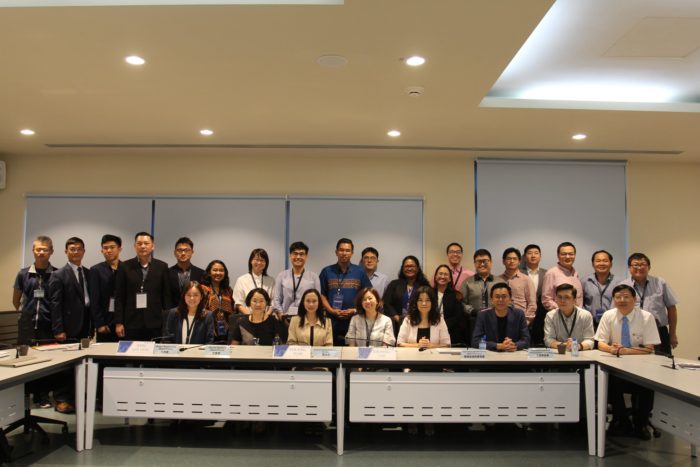
This was the key message of Audrey Tang, the world’s first transgender minister, in a recently concluded seminar-workshop by the Council of Asian Liberals and Democrats (CALD). Tang, who leads the Digital Ministry of Taiwan, fittingly utilized an interactive online teleconference to emphasize that smart city is about smart citizens. “It should focus on narrowing the resource and technology gap in order to integrate and empower the local sector”, she added.
Held in Pingtung, Taiwan on 23-27 August 2019, the event was attended by 23 delegates from 9 Asian countries who discussed the key issues and challenges of smart-cities in the region. The delegates also helped in finalizing the CALD Smart City Assessment Tool – an instrument intended to evaluate the smart city status of cities governed by CALD member parties. Pingtung City Government, in cooperation with the Democratic Progressive Party (DPP), hosted the seminar-workshop.
One of the speakers was Elroy Redor of the Center for Liberalism and Democracy in Philippines, who talked about the use of technology to reduce transaction costs. He also stressed, however, that non-technological technologies can be utilized to reduce complexities and promote modern solutions and innovation.
Supasith Limsakul, a member of the Committee on Policies and Strategies of the Democrat Party Thailand, focused on the smart developments in Phuket – from smart health that provides patient information accessible by doctors via Cloud technology to smart environment that reduces energy consumption and promotes real-time environmental awareness. He said that Phuket is the first smart city in Thailand that aims to be an economic corridor where all sectors can benefit.
Chang Yu-hsuan, an independent researcher from Taiwan who has worked with Open Culture Foundation, focused on disinformation maps that show the situation of countries vis-a-vis self- censorship, cyber troops, legislation against fake news, freedom of information, among others. He said public participation and information help promote smart citizenship.
The delegates also had a dialogue with the directors of the Pingtung City Government. The directors highlighted the smart features of their city including smart governance that covers social welfare, culture and education, economy and construction, among others.
A good example is the smart disaster prevention app that “provides integrated information on geochemical meteorological services, disaster prevention warning information and open materials for various disaster prevention-related units, and customized disaster prevention action application platform.”
A study tour was also conducted to get a first hand experience of the smart city initiatives in Pingtung. The delegates went to the Pingtung Agricultural Biotechnology Park that develops biotech testing and environmental control facilities. They also visited the Yong-da Community that features an inter-generational park for elders, children and people with disabilities and a GPS-enabled pendant that tracks elders with dementia. The last stop was a tour of the aqua solar farm, a first in Taiwan, which provides not only green energy but also promotes groundwater conservation.
One of the delegates, Stanely Kok Xuan from the Singapore Democratic Party, said: “After attending this workshop, it actually cleared a lot of thoughts and doubts I have about smart cities.” He explained that his major concern was “that smart cities actually excludes the public and the citizens from decision making because they might not possess the right technical knowledge.” However, after hearing from the speakers, he noted: “I realized that democracy, liberalism, and smart cities are compatible. My biggest takeaway is learning how to consolidate democratic elements with smart cities.”
The event also witnessed the sister cities signing between Chao Zhou Township, Pingtung, Taiwan represented by Pin Chuan Chou (DPP Taiwan) and Roxas City, Philippines represented by Mayor Ronnie Dadivas (Liberal Party of the Philippines). This cooperation was initially discussed in Seoul, South Korea during CALD’s first Smart City event when the Deputy Magistrate of Pingtung, Li-Hsueh Wu, and Dadivas met and considered the possibility of a formal sister city signing ceremony to establish economic and cultural exchanges between the two cities.
During the signing ceremony and farewell dinner hosted by Pingtung Magistrate Men-An Pan, he thanked CALD and the delegates for visiting Pingtung and fostering partnerships and cooperation that would help improve their smart initiatives and promote their vibrant culture.
“Pingtung, although it is a semi-rural area, has many innovative, knowledge-based new technologies and new techniques to improve the livelihood of their people… I hope that the workshop and the various visits have been useful in further developing the liberal agenda in the region”, said Bi-khim Hsiao, Chairperson of CALD and DPP Member of Parliament.
|
Categorised in: News Article
This post was written by CALD
 Unit 409, 4/F La Fuerza Plaza 2, 2241 Don Chino Roces Ave. corner Sabio St., 1231 Makati City, Philippines
Unit 409, 4/F La Fuerza Plaza 2, 2241 Don Chino Roces Ave. corner Sabio St., 1231 Makati City, Philippines
 +632 8819 60 71
+632 8819 60 71
 info@cald.org
info@cald.org